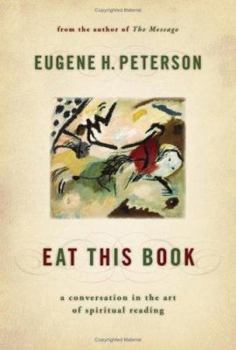Eat This Book: A Conversation in the Art of Spiritual Reading
(Book #2 in the Spiritual Theology Series)
Select Format
Select Condition 
Book Overview
Eat This Book challenges us to read the Scriptures on their own terms, as God's revelation, and to live them as we read them. With warmth and wisdom Peterson offers greatly needed, down-to-earth... This description may be from another edition of this product.
Format:Hardcover
Language:English
ISBN:0802829481
ISBN13:9780802829481
Release Date:July 2009
Publisher:William B. Eerdmans Publishing Company
Length:186 Pages
Weight:0.98 lbs.
Dimensions:0.7" x 6.4" x 9.2"
Customer Reviews
4 ratings
Refocuses how you approach Scripture
Published by Thriftbooks.com User , 17 years ago
Along with John Ortberg's "The Life You've Always Wanted" and J.G. Marking's "A Voice Is Calling," this book has done the most in my life to help me get a fresh look at entering the Word of God. Peterson does an amazing job of challenging the reader to not only read Scripture but to encounter the Word, expecting transformation. I believe this is Peterson's greatest strength is that he believes and thus conveys to the reader how vital seeking the presence of Christ within the pages of Scripture instead of simply looking for information. Peterson brings up a number of good points, especially that it is not so much whether you are reading the Bible that counts but how you read it because how you approach it ultimately determines just how much you get out of it and how much you can then grow. Though sometimes long-winded, the book is a great discussion and examination without boring but engaging the reader. Fantastic.
Make a meal of it!
Published by Thriftbooks.com User , 17 years ago
This is the first book I can recall reading that addresses "How to read the Bible" ... There's 3 essays here: Eat this Book - John the Revelator, Ezekiel, and Jeremiah all ate God's message on command. What does the gastronomic lesson teach? Consuming God's message goes beyond the typical scriptural read. Lectio Divina -Christ asked "How do you read?" in Luke 10:26 ... God only talks with you ... not through someone else. You can only hear him when you are addressed. Here's a discipline for creating the opportunity. The Company of Translators - A great walk through the back alleys of translating the Good News for contemporary consumers through the ages. Is the 16th century King James hard to digest? Unless you read ancient Hebrew or vernacular Greek bolstered by late 19th and 20th century linguistic revelation, it makes sense to try to understand the message as close to the dirty, dusty streets of the gospel writers as you can get with words alone. The language of place and time needs transport into terms we can grasp. We recognize the limitations of the written word ... words don't capture body language, the emotional state of the participants, the state of mind of the listener, the smells, the backdrop ... all things that make for understanding beyond words. The job of the translator is indeed a challenge to strangle the most complete sense of the words into contemporary context. The job of the message consumer is no less challenging . This can be an easy read or a study. It depends on your appetite I guess.
transformational reading
Published by Thriftbooks.com User , 18 years ago
Peterson has become my new favorite theologian. I wish reading him had been an option when I was in seminary. I have a suspicion that he's still not on the menu because he sees theology as something more than an academic exercise. Theology is ultimately about experiencing God and serving the Kingdom-goals that are not always in tandem with the academy. This second volume of a projected five volume series is an exceptional work on the nature of scripture and how we relate to it, absorb it and live it. Rather than treating scripture as a still life from which we extract a theology, Peterson emphasizes the reader entering the story and allowing the story to transform our lives. More than just telling us to read and absorb, he helps us rediscover one of the church's older practices, lecto divina. He emphasizes that this is not a technique but an attitude of prayerful, respectful reading. So, rather than telling us what scripture is and isn't in cold, sterile categories, he shows us its value for the spiritual journey. Peterson is distilling a lifetime of teaching, growing and ministering in this series of books. I hope that we as church are wise enough to push the academy to listen to his voice.
Live this book
Published by Thriftbooks.com User , 18 years ago
Too often we USE the Bible, but Eugene wants us to enter into and LIVE it. He presents lectio divina (sacred reading) as the best way to do this. Lectio divina is a four-part way of reading Scripture: Lectio. Read. God is speaking, so I listen intently to what he says. Meditatio. Engage. God is speaking to me, so I listen personally. Oratio. Pray. God is speaking to me, so I listen personally and reply personally in prayer. Contemplatio. Live. God is speaking to me, so I listen personally and reply in prayerful living. The final section of the book is an illuminating introduction to Bible translation and ultimately to The Message (his translation) itself. He argues that literalism in translation encourages USING the Bible as a tool, in which case we're in charge, not God. But putting the Bible in the same language as our day-to-day lives encourages LIVING the Bible, in which case God's in charge, not us. The publisher is also releasing a study guide for small groups that I have written with Eugene. Once you read the book on your own, I think you'll understand why it is so important to study (and live!) together as a church. Don't just use the Bible. Eat it! Let it get inside of you and change you. Live it.





